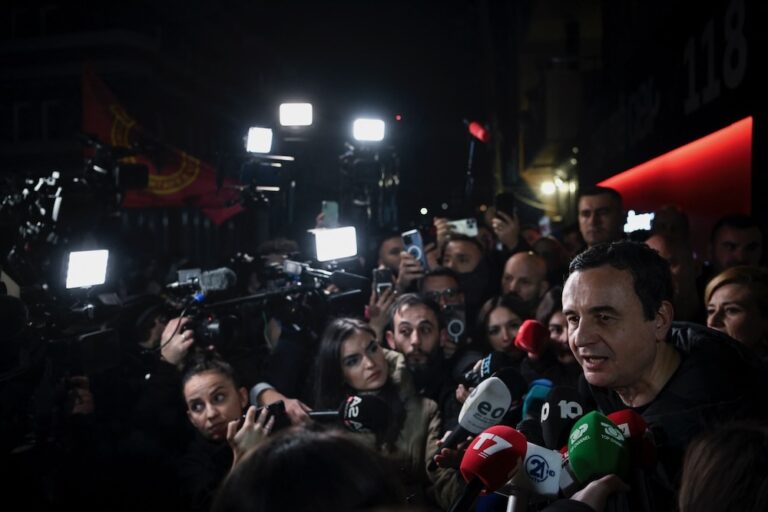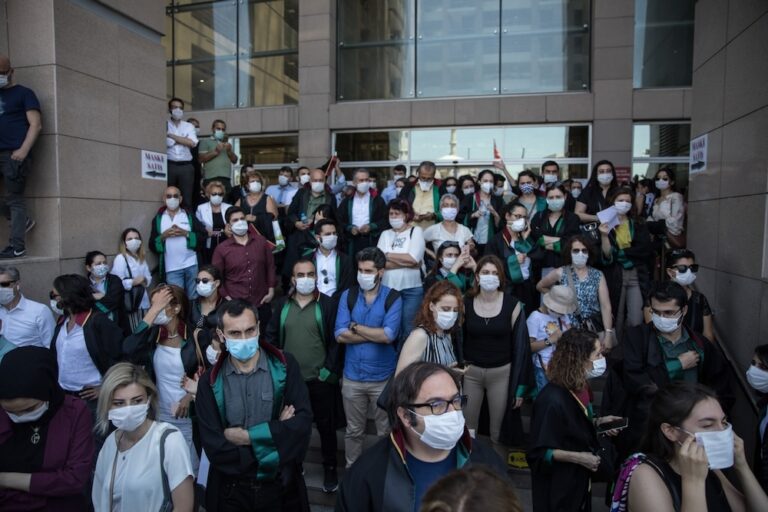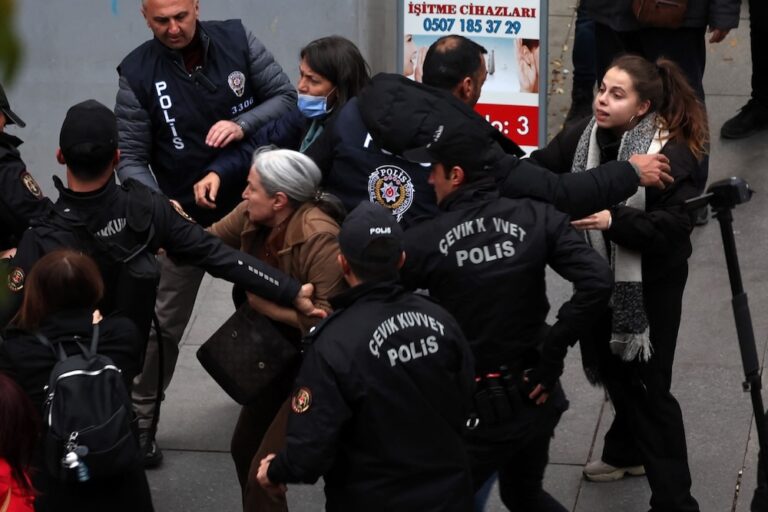While a judicial reform package that is supposed to limit the abuses of Turkey's anti-terrorism legislation is due to be submitted to parliament soon, previous reform packages have had little effect on freedom of information in Turkey.
While a fourth judicial reform package that is supposed to limit the abuses of Turkey’s anti-terrorism legislation is due to be submitted to parliament soon, Reporters Without Borders regrets that the previous reform packages have had little effect on freedom of information in Turkey.
“Dozens of journalists still languish in prison without being tried,” Reporters Without Borders said. “As in the past, judges still do not bother to provide concrete grounds for their decisions to keep journalists in provisional detention. Arrests and convictions continue at the same disturbing pace. Eight months after adoption of the ‘third judicial reform package’ (Law 6352), no significant progress has been made.
“Reducing the applicability of antiterrorism legislation to media cases would be a big step forward, one that has been postponed for too long. But to end the judicial harassment of journalists in Turkey for good, this new reform must tackle all the repressive laws. And it must be drafted with sufficient precision to avoid giving police, prosecutors and judges any room for misinterpretation.”
Unlimited provisional detention – still being abused
The 277th hearing in the trial of presumed members of the Ergenekon ultranationalist conspiracy was held on 11 March. The defendants include the journalist Mustafa Balbay, who has just begun his fifth year in provisional detention.
The Istanbul court that is trying them rejected his request for conditional release at the previous hearing, on 18 February. It also rejected the request of fellow journalist Tuncay Özkan, held since September 2008.
Two journalists who have been detained since September 2006 – Füsun Erdogan, the former editor of the publication Ozgür Radyo, and Bayram Namaz, a reporter for the far-left weekly Atilim – will appear before an Istanbul court today.
Erdogan has described the circumstances of her arrest, her detention and the many procedural irregularities in the proceedings against her in a letter recently received by Reporters Without Borders (downloadable here, in English).
“Because of ‘classified’ clause on my file, no information was shared by the court until the summer of 2007”, she wrote. “I was not able to défend myself until the third hearing in 2008. So, this meant I was kept in prison for exactly two years without knowing why I was arrested. (…) On top of all these legal issues, I have been facing some health problems since my arrest: high blood pressure, hepatitis B, cysts in both breasts and increased myopia (…). As if these were not enough, I was diagnosed with thyroid cancer and operated on November 13, 2012.”
“Keeping journalists in provisional detention for such a long time is outrageous and constitutes a flagrant violation of Turkey’s international obligations,” Reporters Without Borders added. “They must be granted a conditional release at once, and then must be given a fair trial.”
Özlem Agus, a reporter for the Kurdish news agency Diha, was released conditionally on 25 February after more than a year in provisional detention. The court finally decided to take account of “the length of time she has already spent in preventive detention, the prosecution’s evidence, and the fact that there is no risk of her tampering with evidence.”
But she is still facing a possible 23-year jail sentence just for doing her job. According to the prosecution, her photos of policemen during the funeral of a member of the armed separatist Kurdistan Workers Party (PKK) and her photos shutters lowered by shopkeepers in protest against PKK leader Abdullah Öcalan’s imprisonment were taken on instructions from the Kurdish separatists.
Another journalist with the same news agency, Cengiz Oglagi, was released on bail of 5,000 Turkish lira (2,175 euros) in the southeastern city of Cizre on 23 February after being arrested and held overnight. Accused of collaborating with the PKK, he will be subject to judicial control.
On 30 January, an Istanbul judge rejected a request for the release of Sami Mentes, a young reporter for the daily Yurt (Fatherland), who had been arrested earlier in the month as part of an investigation into the DHKP-C, a small leftist armed group. His lawyer only learned of this several days later.
Contrary to Law 6352, no hard evidence was produced to justify his continuing detention. The judge simply ruled that it was “proportional given the importance of the case and the sentence that could be incurred” and that “judicial control would be ineffective.” The report of Mentes’ interrogation suggests that the main evidence against him is his alleged participation in illegal demonstrations.
Suspended journalists
Although Law 6352 has led to the suspension of a number of proceedings initiated prior to 2013, it has not stopped judges imposing disproportionate sentences on journalists. At best, jail terms have been suspended or commuted to fines. But then the defendants are denied the right of appeal and are forced to work under permanent threat of a suspended sentence being applied.
Two online journalists – Yüksel Özbek, the publisher of the Haber Rüzgari news website, and Ali Dursun, owner of the Görele Sol website -– were given suspended sentences of 11 months and 20 days in prison on 12 February for insulting Prime Minister Recep Tayyip Erdogan in a publication.
They were also placed under judicial control for five years, which means that if they commit “another crime of the same nature” within that period, they will have to serve the jail time. The offending articles called on the prime minister to comment on accusations of corruption that a lawyer had made against one of the prime minister’s lawyers.
Reporters Without Borders learned on 25 February that the columnist Rasim Ozan Kütahyali was given a three-month jail term (later commuted to a fine) for “insulting the memory” of an alleged torturer in an op-ed piece in the daily Takvim. Published in April 2012, it referred to systematic torture in a prison in the southeastern city of Diyarbakir in the 1980s and blamed the prison’s commander, Oktay Yildiran.
Temel Demirer’s trial on a charge of “denigrating the Turkish nation” under article 301 of the criminal code was suspended by an Ankara court on 19 February on the basis of Law 6352. Demirer had been facing a possible three-year jail term for saying, after his Turkish-Armenian colleague Hrant Dink’s murder in 2007, that Dink was “not murdered because he was Armenian but because he recognized the Armenian genocide.”
Demirer deplored the decision to suspend his trial, which he said deprived Turkey of a needed debate about the repeal of the infamous article 301. “You can convict me or acquit me, but I refuse to submit to a suspended conviction,” he said as he left the court.
Repressive legislative arsenal
Ferhat Parlak, the publisher of the newspaper Silvan Mücadele, is being investigated on suspicion of “attacking the indivisibility of the state and the integrity of the nation” under article 302 of the criminal code for using the word “Kurdistan” in an article.
If the case goes to trial, he could face life imprisonment. He was recently sentenced to 10 months in prison for “insulting a police officer and “exposing him to being targeted by a terrorist organization.”
A new investigation is under way into Halil Savda, the editor of the pacifist news website Savaskarsitlari.org on suspicion of “discouraging the population to do military service” (under article 318 of the criminal code). He previously spent nearly two months in provisional detention in early 2012 on the same charge.
The taboos imposed by the nationalist ideology of Mustafa Kemal Atatürk, the Turkish Republic’s founder, are being compounded by a new generation of taboos stemming from the growing sensitivity of religious issues.
Proceedings have just been initiated against the journalist Sevan Nisanyan on a charge of “offending the religious values shared by part of the population” under article 216 of the criminal code (adopted in 2005) because of messages critical of Mohammed posted on Twitter. The charge carries a sentence of nine months to a year in prison.


